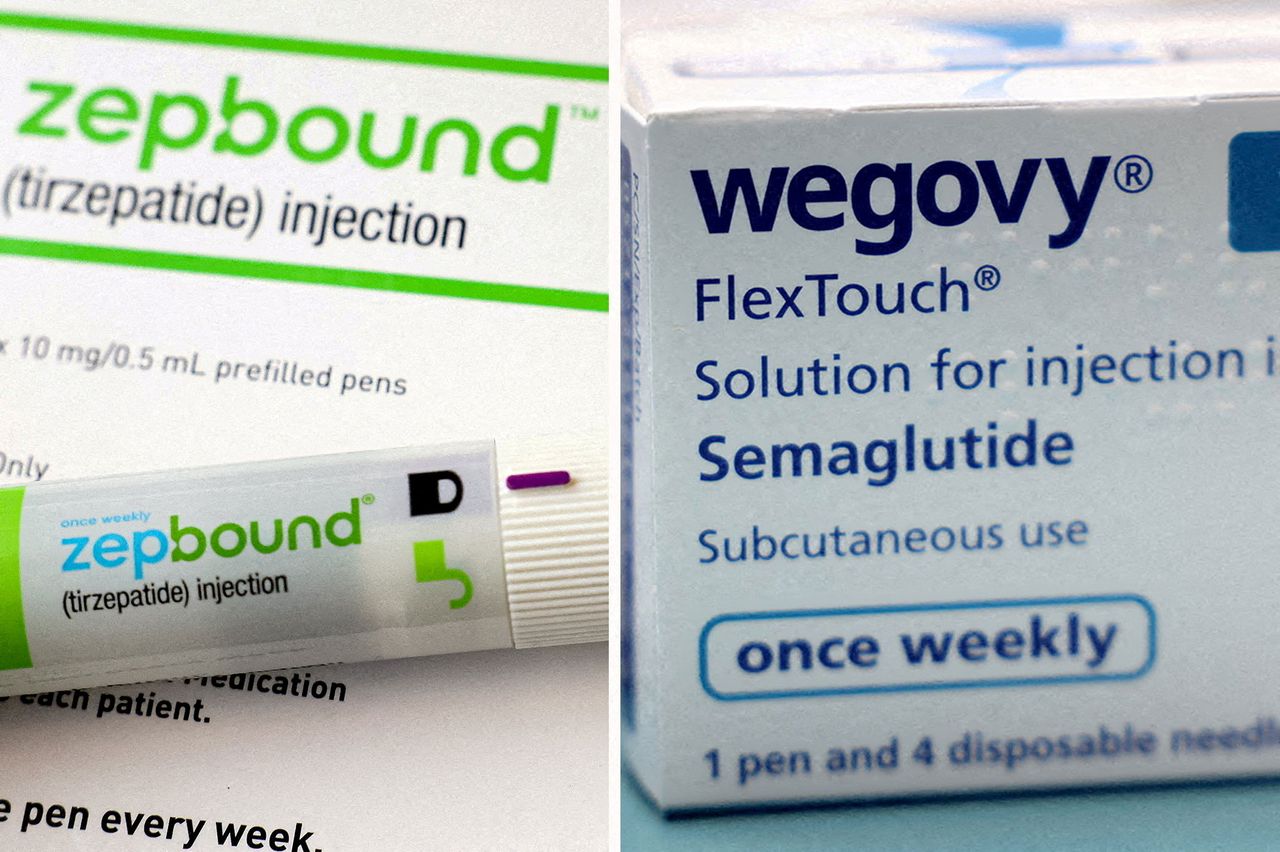| |  | | | | |  | By Megan R. Wilson | - GLP-1 deal: Eli Lilly and Novo Nordisk are the latest drug giants announcing a deal with the Trump administration — which would include lower prices on some of their blockbuster weight loss drugs, according to The Washington Post.
- A break in the shutdown?: Some lawmakers are tentatively optimistic that there could soon be a path to reopen the government.
Good afternoon, and welcome to the Health Brief. I’m Megan Wilson and I’m watching for the health care implications from the elections happening across the country today. More on that Wednesday. Send all your best health policy intel, tips, scoops and thoughts on the health-related election thoughts to megan.wilson@washpost.com or message me on Signal at megan.434. This newsletter is published by WP Intelligence, The Washington Post’s subscription service for professionals that provides business, policy and thought leaders with actionable insights. WP Intelligence operates independently from the Washington Post newsroom. Learn more about WP Intelligence. | | | |  | The Lead Brief | The Trump administration could announce a drug pricing deal with Eli Lilly and Novo Nordisk as early as Thursday that involves the companies’ blockbuster weight loss products, according to my colleagues Dan Diamond and Rachel Roubein in the Washington Post newsroom. The deal would include a $149 per month price tag for the companies’ popular GLP-1 weight loss drugs in some cases — a massive discount from the amount Novo and Lilly charges patients who buy the medicines directly from them. The Post’s reporting stems from conversations with three people familiar with the deal granted anonymity to talk about the plans. → It’s part of President Donald Trump’s push for pharma giants to lower their drug costs in line with what other wealthy countries pay, known as “Most Favored Nation” pricing. Pfizer, AstraZeneca and EMD Serono have each made their own drug pricing pacts with the administration. My colleagues are reporting that two of the people said the upcoming deal announcement would be coupled with a new pilot program, also set to be finalized this week, that would cap the costs of GLP-1 medications for some Medicare beneficiaries and expand access to the drugs. Medicare can cover Novo Nordisk’s Ozempic and Wegovy to treat diabetes and Eli Lilly’s Zepbound for sleep apnea, but the coverage doesn’t currently extend to use for weight loss. “Discussion about deals that have not been officially announced by the Administration should be regarded as speculation,” said Kush Desai, a White House spokesman, in an emailed statement. Spokespeople for Eli Lilly and Novo Nordisk confirmed that the companies were engaged in discussions with the administration but did not answer questions about the plans. A corporate spokesperson for Eli Lilly told me in an email that it’s in talks with the administration to “further expand patient access, preserve innovation, and promote affordability of our medicines.” Endpoints News first reported the agreement and said the $149 would apply to the lowest doses of the medicines. → Ozempic and Wegovy, both made by Novo Nordisk, were also selected for Medicare negotiation under the Inflation Reduction Act. The administration is set to announce negotiated prices for the 15 drugs that have been under negotiation in the coming weeks. |  | | Zepbound is Eli Lilly's weight loss drug, and Wegovy is Novo Nordisk's GLP-1 weight loss drug. (Reuters Photographer/Reuters) | | | |  | Market Moves | Commercial health plans have bristled at covering the GLP-1 medications to treat obesity due to their high cost — which can be more than $1,000 per month before discounts and rebates — and many patients have opted to pay cash directly for the drugs. Eli Lilly offers the 2.5mg starter dose of its GLP-1 medication, Zepbound, directly to consumers at $349. Higher doses cost $499 per month, the same price Novo Nordisk charges for its GLP-1 competitor, Wegovy, for people paying cash. → Last month, Trump previewed the deal for obesity drugs during another drug pricing announcement with EMD Serono involving its fertility treatments: “Instead of $1,300, you’ll be paying about $150,” he told reporters during the Oval Office briefing, later clarifying he was talking about medications like Zepbound and Wegovy, which he called the “fat loss drugs.” Mehmet Oz, the head of the Centers for Medicare and Medicaid Services, quickly interjected that negotiations on GLP-1 drugs were not yet complete. Market reaction is mixed: Following the comments, the stocks for Novo Nordisk and Eli Lilly dipped. After the Endpoints initial reporting this morning about the $149 deal price for some people, stock prices for both Novo and Lilly temporarily spiked. → Eli Lilly and Novo Nordisk have been lowering their cash-pay offerings to consumers in an effort to compete with companies that offer compounded versions of the GLP-1 drugs at lower prices, which drugmakers have argued are unsafe because those products — unlike their own — are not approved by the Food and Drug Administration. The companies offering compounded versions counter that they’re offering personalized versions for patients that are made in regulated facilities. Although the relationship between drugmakers and platforms offering compounded copycats has often been strained, alliances could emerge amid a declining price point: More people being able to access the medications could be a boon to drugmakers’ profits. Novo and telehealth company Hims & Hers Health are in talks for its platform — which offers compounded versions of GLP-1 medications — to sell Wegovy, Hims announced on Monday in its third-quarter earnings release. The company emphasized that the discussions are ongoing and “there is a possibility that no definitive agreement may ever be executed with Novo Nordisk.” (The two had previously had a partnership that ended acrimoniously.) | | | |  | From our notebook | The federal government shutdown — about to enter its 36th day — will become the longest-ever in history, and some policymakers are watching Tuesday’s elections nationwide as the key out of it. Senate Majority Leader John Thune (R-South Dakota) said on Monday that he’s optimistic that talks between bipartisan rank-and-file senators could yield results. Although there’s hope for a deal this week, members caution that talks are still tentative and fragile. The Washington Post’s Theodoric Meyer reported on the state of play — and how some Democrats are pinning their hopes on having a successful election night in races around the country that translate into policy wins on Capitol Hill. In light of that report, here are three things to watch: 1. Real consumer pain: There are several other economic and social pressures also coming into play that could force both sides to get together, including a growing crisis among air traffic controllers that’s causing massive delays at some airports around the country. Food assistance is in limbo and people who purchase health insurance through the Affordable Care Act marketplaces are seeing premiums spike. Meanwhile, some veterans are having trouble accessing some of their benefits, and a union representing federal workers last week told lawmakers to open the government by passing the funding legislation on the table. “Both political parties have made their point, and still there is no clear end in sight,” reads the open letter from Everett Kelley, the national president of the American Federation of Government Employees. 2. Five Dems needed to flip: Two Democrats and Sen. Angus King of Maine, an Independent that caucuses with the Democrats, have consistently voted for the House-passed funding bill. Republican Sen. Rand Paul (Kentucky) has been voting against it. This means Senate Republicans only need to pick up five Democrats in supporting the bill to meet the 60-vote threshold. 3. Length of a funding deal: The House-passed measure — which has failed in the Senate 14 times — runs until Nov. 21, meaning lawmakers will have to make adjustments to the GOP-drafted legislation either way. While some — including Republican leadership — want a longer-term funding bill that goes until January, Senate appropriators are wary. Sen. Susan Collins (R-Maine), who leads the appropriations panel, has told reporters she prefers crafting a bill that goes until Dec. 19, worried that a January end-date would result in “a disastrous yearlong” stopgap bill, instead of enacting regular appropriations. | | | | | | | | | | | | |